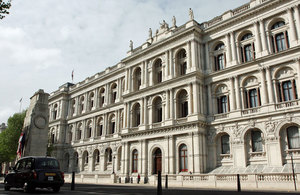UK announces £1m towards the international response for people affected by the typhoon and extreme flooding in Southeast Asia
FCDO Minister for Asia, Nigel Adams, has announced the UK will contribute a total of £1 million to help victims of Typhoon Goni in the Philippines, and those impacted by the recent devastating flooding in Vietnam.
The powerful Category 5 typhoon struck the Philippines on Sunday and has resulted in loss of life, many people reported missing and has affected over 2 million people across 12 regions.
Vietnam has also recently been hit by four typhoons, resulting in significant flooding, landslides and damage to infrastructure. In central Vietnam over 1.3 million people have been severely affected, with nearly 300,000 houses submerged. Neighbouring countries Cambodia, Laos and Thailand have also been impacted, and we continue to monitor the situation there.
The £1 million of UK aid will go to the International Federation of Red Cross (IFRC), through the British Red Cross Society, to local Red Cross partners and help to provide shelter, clean water, food and support livelihoods for around 160,000 people in Vietnam and 80,000 in the Philippines.
FCDO Minister for Asia Nigel Adams said:
The typhoons that have hit the Philippines and Vietnam have had a devastating impact on lives and livelihoods across the region.
Today’s £1 million UK aid package will help to deliver life-saving food, clean water and safe shelter to those who need it most and help both the Philippines and Vietnam recover from such destructive natural disasters.
The IFRC have launched separate Emergency Appeals for both countries to scale up the Red Cross response. In Vietnam they are hoping to target 44,000 people with shelter assistance, 17,200 with livelihoods support, 50,000 with health and 84,000 with water, sanitation and hygiene assistance. In the Philippines, the IFRC, along with the government and other partners, are currently assessing the damage caused by Typhoon Goni and which locations are in most urgent need of assistance.
